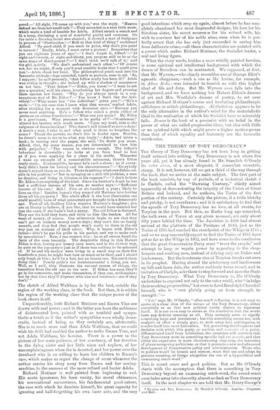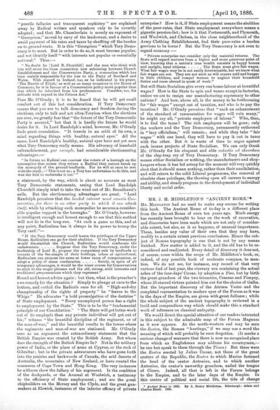THE THEORY OF TORY DEMOCRACY.*
THE theory of Tory Democracy has not been long in getting itself reduced into writing. Tory Democracy is not above five years old, yet it has already found in Mr. Standish O'Grady its vales socer, of a most eloquent, if somewhat eccentric, stamp. It is not, however, till we get a third of the way through the book, that we arrive at the main subject. The first part of the book consists, by way of prelude, of a historical sketch et la Carlyle, called the "Dawning Century," chiefly aimed apparently at demonstrating the iniquity of the Union of Great Britain and Ireland, and its authors, the Tories of the first portion of the century. Certainly the picture, if a trifle blotchy and patchy, is not overdrawn ; and it is satisfactory to find that the apostle of Tory Democracy has no love, at all events, for Toryism in the past. But then, as Burke long ago remarked, the bulk even of Tories at any given moment, are only about fifty years behind the time. The Jacobites in 1688 had almost arrived at the platform of the Puritans of 1640, just as the Tories of 1785 had reached the standpoint of the Whigs in 17-1.5 and so we may reasonably expect to find the Tories of 1885 have got as far as the Whigs in 1832, and have come to the conclusion that the great Conservative Party must "trust the people," and attempt to keep or regain power by appealing to the shop- keepers and working men, instead of relying only on Dukes and landowners. But the inveterate vice of Toryism breaks out even in its prophet. Having abused the aristocracy and landowners up hill and down dale, the author suddenly turns round, and in imitation of Carlyle, asks them to step forward and save the State by Tory Democracy. What Tory Democracy is, Mr. O'Grady undertakes to expound not only to the outer world, who "indulge their mocking propensities," but even to Lord Randolph Churchill hiinself, who is "seen plainly going on from strength to strength :'- "Yet," says Mr. O'Grady, "after much reflection it is not easy to arrive at a clear idea of the nature of the Tory Democracy, either essentially or as that new political entity desires to represent itself. It is not even easy to arrive at the conviction that the words have any definite meaning at all. They certainly seem to signify something large and portentous ; but this something seems too, with analysis or after a steady gaze, to melt away into nothingness, or resolve itself into mere Liberalism. Yet, perceiving the sharpness and decision with which this party, or nucleus and materies of a party, differentiated itself from Liberalism, the suspicion still survives that Tory Democracy meet be something specific end sui generic, and that either the expression is mere electioneering clap-trap, the invention of phrasemongering politicians, or that it points to a new and advanced development of Conservative policy and administration. Those who in politics would be honest and earnest, must find out and adopt its genuine meaning, or forego altogether the use of a hypocritical and unmeaning catch-word."
This is sound sense and good politics. But as Mr. O'Grady starts with the assumption that there is something in Tory Democracy beyond an unmeaning catch-word, the sound sense soon fades away into obscurity almost as dark as Tory Democracy itself. In the next chapter we are told that Mr. Henry George's
• Toryism and Tory Democracy. By Standieh O'Grady. London : Chapman and Hall.
"puerile fallacies and transparent sophistry" are explained away by Radical writers and speakers only to be covertly adopted ; and that Mr. Chamberlain is merely an exponent of " Georgeism," moved by envy of the landowner, and a desire to avoid payment of his rates and taxes by shuffling off the burden on to ground-rents. It is this "Georgeism " which Tory Demo- cracy is to meet. But in order to do so, it must become popular, and not identify itself " with interests not popular or essentially national." Thus :—
" No doubt he [Lord R. Churchill] and the men who think with him will sever the close connection now subsisting between Church Establishment and the Conservative Party, a connection which has been mainly responsible for the loss to the Party of Scotland and Wales. With regard to Ireland, too, as he indicated in his paper, The Mantle of Elijah,' as well as on many occasions in the House of Commons, he is in favour of a Conservative policy more popular than that which he inherited from his predecessors. Consider, too, his attitude with regard to the Crimes Act."
Poor Mr. O'Grady ; it is to be feared that he will get small comfort out of this last consideration. If Tory Democracy means that you are to talk democracy and freedom during the elections, only to talk and act ultra-Toryism when the elections are over, we greatly fear that "the future of the Tory Democratic Party is assured," but that it is hardly the future he would desire for it. In Lord Randolph's mind, however, Mr. O'Grady finds great consolation. "It travels in an orbit of its own, a mind regarding things with healthy, natural eyes." All the same, Lord Randolph's healthy, natural eyes have not yet seen what Tory Democracy really means. His advocacy of leasehold enfranchisement, par exemple, had considerable electioneering advantages :—
"In future no Radical can canvass the voters of a borough on the assumption that unless they return a Radical they cannot break up the monopoly of the ground-landlords. For he will at once be met with the reply,—' This is not so ; a Tory has undertaken to do this, and was the first to undertake it too.'"
a statement, by the way, which is about as accurate as most Tory Democratic statements, seeing that Lord Randolph Churchill simply tried to take the wind out of Mr. Broadhurst's sails. But the electioneering advantages are great. "Lord Randolph perceives that the landed interest must remain Con- servative, for there is no other party to which it can attach itself, while by attacking such monopolies he secures a consider- able popular support in the boroughs." Mr. O'Grady, however, is intelligent enough and honest enough to see that this method will not do in the long-run. "At such a game as this, and at any point, Radicalism has it always in its power to trump the Tory card :"—
" If the Tory Democracy would lessen the privileges of the Upper House, Radicalism can go for their abolition. If the Tory Democracy would disestablish the Church, Radicalism would confiscate the endowments. . . . . Suppose that the Tory Democracy, under the leadership of Lord R., propose the compulsory sale by landlords to tenants of the fee-simple of their holdings, urban or agricultural, Radicalism can propose the same at lower rates of compensation, or
adopt a policy of sheer confiscation Surely, in spite of all temporary advantages, it would be the wiser course for Conservatives to stick to the magic phrases and the old, strong, solid interests and traditional prepossessions which they represent."
Sound and honest advice again ; but then, what is the preacher's own remedy for the situation ? Simply to plunge at once to the bottom, and outbid the Radicals once for all. "High-and-dry championship of the rights of property" he "leaves to the Whigs." He advocates "a bold promulgation of the doctrine" of State employment. "Every unemployed person has a right to employment by the State." This is to be the "fundamental
principle of our Constitution." The State will get better work out of its employes than any private individual will get out of his ;" witness "the beautiful discipline of the regiment, or of the man-of-war," and the beautiful results to the towns where the regiments and men-of-war are stationed. Mr. O'Grady uses as an argument the extraordinary statement that the British Empire was created by the British Army. But where does the strength of the British Empire lie? Not in the military power of India, or the place of arms at Cyprus, or the rock of Gibraltar; but in the private adventurers who have gone forth into the prairies and backwoods of Canada, the arid deserts of Australia, the mountains of New Zealand, or have created the commerce of Cape Town and Hong Kong. The very instances he adduces show the fallacy of his argument. Is the condition of the dockyards, or the Arsenal at Woolwich, a testimony to the efficiency of State employment ; and are the great shipbuilders on the Mersey and the Clyde, and the great gun- makers at Elswick, instances of the inferior efficacy of private enterprise ? How is it, if State employment means the abolition of the poor-rates, that State employment everywhere means a gigantic pension-list; how is it that Portsmouth, and Plymouth, and Woolwich, and Chelsea, in the close neighbourhood of the Army Clothing Establishment, find their poor-rates a burden grevions to be borne But the Tory Democracy is not even to regard economy :— "Private enterprise can consider only the material returns. The State will regard matters from a higher and more generous point of view, knowing that a nation's true wealth consists in happy homes
and upright, loyal citizens The State must give fair wages. What fair wages may be is not easily determinable, but we know what fair wages are not. They are not such as will ensure cold and hanger to little children, and compel women to neglect their household duties and roam abroad in quest of work."
But will State Socialism give every one home-labour at bountiful wages ? How is the State to spin and weave except in factories, unless we are to resign our manufacturing supremacy to other nations ? And how, above all, is the money to be forthcoming for "fair wages" except out of taxation, and who is to pay the taxation ? Mr. O'Grady perceives that "such an enhancement of the standard of remuneration for wages will ruin many," he might say all, "private employers of labour." Who, then, is to find the taxes ? The rich employers will be gone ; only the workers and the Tory Democracy, permanently enthroned in "lazy officialism," will remain ; and while they take "fair wages" with one hand, they will have to pay it out in taxes with the other. But it is waste of time to argue against such insane projects of State Socialism. We can only thank Mr. O'Grady for his eloquent and able redactio ad absurdum, of the clap-trap cry of Tory Democracy. If Tory Democracy means either Socialism or nothing, the manufacturers and shop- keepers whom it has led astray for the moment will very quickly elect that it should mean nothing, rather than their annihilation, and will return to the solid Liberal programme, the removal of obsolete class privileges, the thowing open all careers to energy and ability, and steady progress in the development of individual liberty and social order.



































 Previous page
Previous page